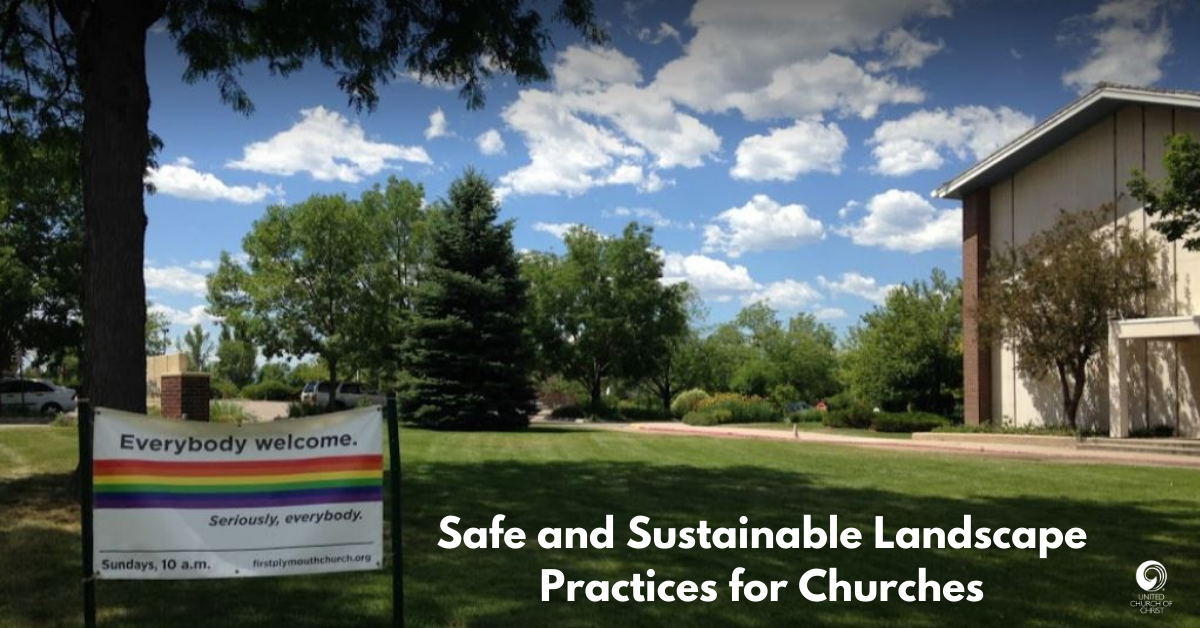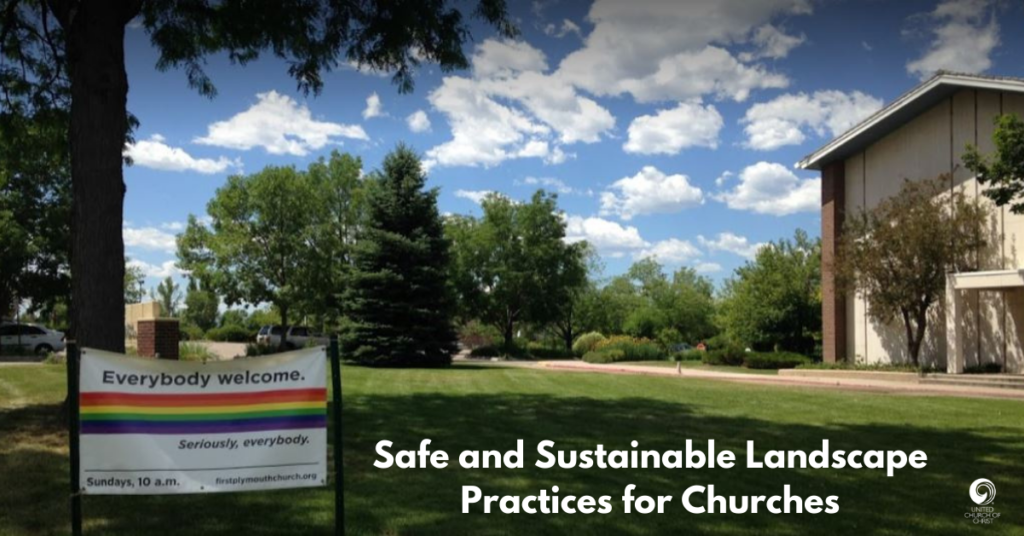Safe and Sustainable Landscape Practices for Churches

As a newly recognized Creation Justice Church and as a Whole Earth Church for the past 26 years, First Plymouth Congregational UCC in Englewood, Colorado, has implemented a wide range of sustainable practices from LED lighting to an annual E-Waste Recycling collection which enables us to have funds for earth care projects. One important practice that we especially recommend is adopting sustainable lawn care.
When our attention turned to the exterior of our campus, we became concerned about the yellow flags placed on our lawns each spring alerting us that toxic pesticides and weed killers had been applied. This practice did not seem safe since children from our pre-school, Sunday School, and youth group sometimes play on our green spaces. It was especially alarming since we have a honeybee hive on our church property which could be adversely affected.
So, we began a long process of searching for safer alternatives. We attended a safe lawn care presentation, tried vinegar applications on our weeds with minimal success, researched local landscape companies that might offer less toxic treatments, and worked with our facilities team to implement some changes.
A note about making changes: it can take time, diplomacy, compromise, and consensus. While our Church Council and building staff supported the idea of bringing our landscape practices and products in line with earth-care values, there was some concern about whether this would adversely affect the aesthetic appeal of the church grounds. Several dedicated Green Team members spent nearly three years educating ourselves about products and practices, researching companies, and slowly building a critical mass of support. And it helps tremendously when the Senior Minister expresses commitment to the outcome.
We finally found a company that offers totally organic fertilizer, a pesticide approved for organic systems, spot treating for weeds instead of an overall spray broadcasting, no toxic 2,4D weed killer, and a weed treatment in our rock landscape areas that is minimally residual in the soil. Our grass is mowed to a length no shorter than 3.5”, clippings are left on the lawn as mulch, and we aerate 2 times a year. We have been pleased with the outcome. Our lawns have never looked greener, weeds are controlled in both the grass and rock areas, our bees are thriving, and hopefully we are building healthier soil with helpful microorganisms that will encourage stronger grass roots and fewer weeds in the future. In addition, we have reduced the amount of toxic chemicals released into our air, water runoff, and grassy areas.
Eventually, we hope to be able to further adjust our landscape maintenance practices to be fully organic. We have been told that it is difficult to achieve a totally weed free lawn without some treatment of emerging weeds in the spring. So, we either need to tolerate some chemical applications with minimal residual effects or some weeds. We have learned that applying a layer of compost on lawns and overseeding with regionally appropriate grasses could promote our goal of building healthy soil organically with beneficial nutrients and microorganisms that will develop strong grass roots to crowd out weeds. But that expense doesn’t fit our present budget, so it is a future goal.
A related development has been a decision to change our trash service to a company that will pick up compost collected from our building. Wouldn’t it be an environmentally beneficial cycle if we could then access the processed compost for our lawns? Another project for our energized Creation Justice Ministry!
Pam Schmidt is the Creation Justice Ministry Co-Chair at First Plymouth Congregational UCC in Englewood, Colorado. This article is part of an ongoing series on best practices for Creation Justice Churches.
Related News
Walking the Talk: Environmental Practices and a Commitment to Justice
St. James United Church of Christ in Hamburg, New York (a suburb of Buffalo) has been...
Read MoreThe Antidote to Power from Above
With its themes of moral reckoning and repentance, this Lenten season brings into stark relief...
Read MoreDon’t Incinerate – Innovate!
Thirty-eight years ago, the United Church of Christ's Commission for Racial Justice released a...
Read More


